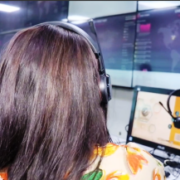By SEGUN ORUAME, Lagos

Nigeria turns 50 this October. For the locally made computer companies, it is a mixed grill: A mix of blessing s and woes depicting the state of affairs in Africa’s most populous country of 150 million people.
There were no computer companies 50 years ago neither was the computer a common sight. It was not even a common sight a little less than five years ago though local PC makers were already a part of the technology space that has evolved in the IT revolution that came to Nigeria about a decade ago.
If having PC assembly companies was all that was necessary to define all the success story Africa’s most populous country needs to define its success in the last 50 years, Nigeria would be rated on the A+ list.
In the last decade, more than seven PC makers, UNITEC, Pragmatic, Balogtek, Brian Systems, Zinox and Omatek and the more recent Geniac and Veda have arrived on the scene. About three have completely disappeared from the landscape.
The surviving players are only managing to keep afloat for a mix of factors.
Two players, Zinox and Omatek lead the league. Between them, they dominate the share of the PC market controlled by the local PC assembly companies. The two combined has less than 35% of the entire sales in 2009.
The market has expanded in terms of patronage and reach that transcends private and public sectors. But it has remained largely a domain of foreign players leaving a fraction of the margin for the local PC makers to contend with. For every one PC that Omatek or Zinox sells HP and Acer sells between 7 and three. The remaining margins go to Dell, Mercury, Toshiba, Sony and other foreign brands. All combined, they controlled about 65% of the market giving them a strong edge over the local players, particularly Zinox and Omatek.
Mindful of the need to promote local PC assembly, the Chief Olusegun Obasanjo administration issued a directive that all MDAs (ministries, departments and agencies) must patronized local PC makers and consider foreign brands only if the local brands could not meet up with the requirements. Government policy was designed to help generate employment in the PC sub-sector and grow local capacity in computer assembly.
This helped. The policy drive increased sales for Zinox and Omatek; and is largely responsible for the successful implementation of local PC solutions in the public sector. During the Obasanjo years, Nigeria witnessed a phenomenal growth in local computer assembly and manufacture helped by the deliberate and conscious effort of the government to promote the local brands.
The public sector acceptance has not been equaled by the same level of private sector acceptance. The private sector has largely remained the confine of the foreign brands with a level of consistency that has not helped to properly position the local brands in corporate Nigeria. You could see Omatek and Zinox systems conspicuously in any of the ministries or government agencies but not so in the financial, oil and gas sectors where acceptance has been low. Because these sectors are the defining sectors in Nigeria’s formal sector were the big money lies, it means the local PCs are still outside of the formal sector and outside the big money.
And then even those years of market favour in the public sector have been followed by a somewhat level of increasing apathy. There is heightening tendency to reject the locally made PCs in favour of the foreign brands. HP and the rest of the offshore brands are beginning to win back open acceptance with dire consequences for the local brand.
The consequences are manifold. Sales have shrunk forcing many of the local companies to either close down or reduce their existing staff strength. Faced with reduced incentives from government, absence of robust support infrastructures, inadequate power supply insufficient technical staff and hyper competition from foreign brands, the market is fast ebbing and may completely disappeared for all the local PC makers. “We may have 50 years of celebrating the joyful coming and sad disappearance of made-in-Nigeria PCs,” said one analyst in Lagos.
No doubt, government needs to increase its support base for the local PC makers. But the companies also need to get acts right. Too much attention is paid to getting MDAs patronage and so little is done to target the wider markets outside government where there is more rapid deployments of PCs. As one analyst put it, “advertising methods are not reaching the populace; instead concentration is made on supplying to government institutions.”
Besides, as many users in the public sector revealed, though many locally made computers come in good quality but they do not compare favourably with their foreign counterparts in terms of after sales support. Here, their major weakness is exposed. Not many local brands can boast of after sales technical expertise that the foreign brands give their customers thus lowering the value of the TCO (total cost of ownership). The onus is therefore on the local PC makers to improve their total market relevance before they could up sales and profit.






























